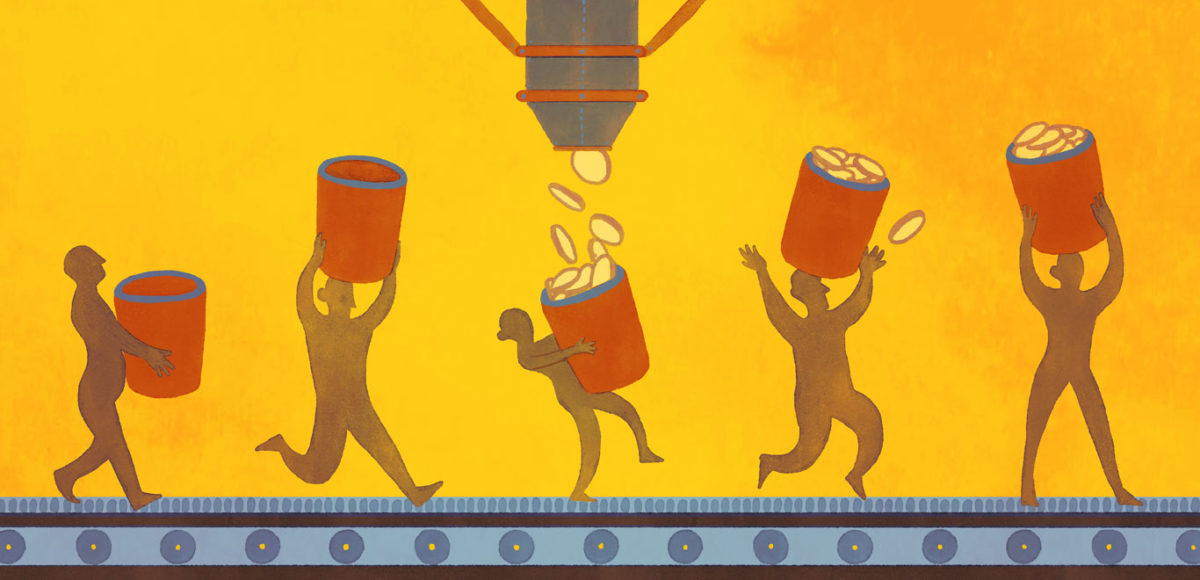by Clemens Lukitsch
Dignity is many a times derived from purpose or profession. We pity the unemployed or unemployable that have to rely on social assistance and the welfare state – no matter if their situation is self-inflicted or not. We may sympathize or even solidarize with them, believing that everyone should be entitled to a self-determined life and be given indiscriminating opportunity to participate in society. At the dawn of a new industrial era shaped by advanced robotization and machine intelligence, some deem it feasible to guarantee universal basic income to everyone ensuring participation and integration in society.
There is a wide array of different ideas and assumptions on how such an income system could be implemented. For this text, let us assume that universal basic income would be unconditionally given to everyone: children, adults, elderly, the rich, and the poor.
What we do for a living greatly affects our physical and mental constitution, our political views, and our social environment.
The pursue of a profession serves a number of purposes in a society. A low unemployment rate is more than a desirable economic parameter. Economists and sociologists alike praise the integrative abilities of the labor market for a society. The unemployed are a burden for society in a double meaning: for one thing in case of the unemployable (if they are too old or too sick to work) labor force and funds need to be distributed to tend to them. If they’re able to work but are self-inflicted unemployed, they tie up funds that could be distributed more efficiently to other sectors of the economy (if you disregard their function as factor for domestic demand). For another thing, economists and sociologists might argue, unemployed potentially cause societal disorder: an employed person will be less likely to engage in criminal or other socially adverse activities out of poverty or lack of prospects.
What we do for a living greatly affects our physical and mental constitution, our political views, and our social environment. Unless one is an inheritor of a considerable fortune, not having to work in order to earn a living is something unprecedented for a vast majority of people. Giving an universal basic income to everyone would mean nothing less than considering an alteration of the state of humanity (and to a great part what we define today as a dignified and fulfilled life).
If we leave aside the thought that labor may not play a defining role in the structure of a society anymore there are still some solely economic aspects to be considered.
In a market economy with a competitive labor market wages and leisure time can be regarded as part of a tradeoff-relationship. A great number of people mainly work to pay their bills and maintain a socially acceptable life. In order for them to earn a living, they will have to yield up leisure time. According to the rule of diminishing marginal utility, the more they work their benefit from leisure time will rise and their benefit to work extra hours in order to further increase their earnings will fall. If we assume the implementation of a universal income system, the marginal benefit for working hours would decrease. Taking into account that contentment rises relatively to income with a diminishing rate, the benefit for working as much or even longer hours without universal basic income would be considerably smaller. At the same time, the benefit for leisure time would not be affected by the additional income that is not earned by working hours. Therefore more leisure time can be had for working less and not curtailing disposable income. In effect the total of workforce would be considerably shortened, the price of labor would rise, and overall labor productivity would nominally drop. At the same time a considerable amount of people would reduce their working hours to a point where they can sustain or slightly improve their living conditions. Inevitably with the price of labor rising and nominal productivity slumping, purchasing power would regress as well. A genuine universal basic income would imply the absence of a proper incentive structure. Thus, it makes it incompatible with a competitive labor market.
Considering the above, the notion that being rid of the economic necessity to pursue a profession would unleash untapped creative and productive potential is somewhat counter-intuitive.

 | Technology, AI and ethics.
| Technology, AI and ethics.

